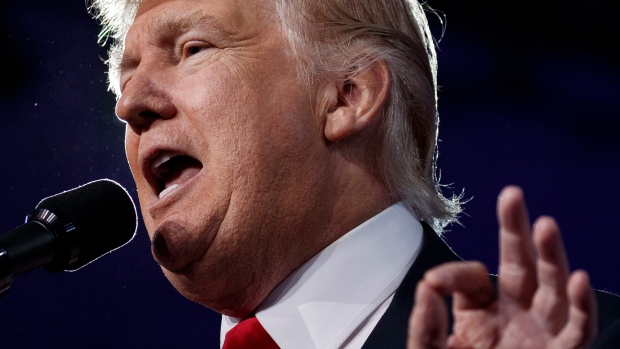Feb 24, 2017
Taxes, trade and immigration: What to expect from Trump’s speech to Congress
, BNN Bloomberg

U.S. President Donald Trump is set to make his first address to a joint session of Congress on Tuesday, a speech in which he’s expected to lay out his Administration’s next steps.
The speech, which is not technically a State of the Union, will come 40 days after taking office and will be an opportunity, the White House says, for Trump to deliver his vision to Congress and the American public.
BNN spoke to Ryan Hurl, a lecturer of political science at the University of Toronto, about what we can expect to hear on Feb. 28.
EXPECT A ‘RESET’
It’s been just over a month that Trump has been in the White House, and he hasn’t wasted any time on policy initiatives, signing multiple executive orders, including his controversial travel ban targeting seven predominantly-Muslim nations, which was blocked after a court ruling earlier this month.
“Some people in the Trump Administration are looking at this as sort of a reset,” Hurl said.
“It will be interesting to see how he frames that particular [travel ban] issue,” he said. “Will he criticize the courts? It would seem to be unwise to me, but perhaps Trump may have a different perspective on that. ”
In a press briefing Thursday, White House Press Secretary Sean Spicer said Trump was working closely with his speechwriting team on his message.
“The theme of the address will be the renewal of the American spirit,” Spicer said. “The address will particularly focus on public safety, including defense, increased border security, taking care of our veterans, and then economic opportunity, including education, job training, healthcare reform, jobs, and tax and regulatory reform.”
Hurl suggested this will also be an opportunity for Trump to transfer some of the leadership on policy reform onto Congress.
He said it’s likely that “Trump tries to connect the actions that he’s taken in the last couple of months with those that require Congressional approval.”
“It’s possible Trump will leave some of these issues with Congress – see what kind of arrangements they can come up with.”
A DIFFERENT TONE
Hurl said at this point in the presidency, it would be wise for Trump to move away from singling out specific people and companies, and make the shift away from exuding a purely business persona.
“I hope at this stage somebody is telling Trump…that he has to separate any connections from Trump the businessman and Trump the president.”
Since taking office, Trump has taken to Twitter to speak out against other leaders, call out companies and criticize the Supreme Court on decisions he’s disagreed with.
“For me it’s too early to know whether Trump’s peculiar way of engaging with the public is going to be a disaster or something in the future we will see as normal,” Hurl said.
“You would think that by this point, his advisers are telling him to avoid those kinds of issues – very off-the-cuff personal replies. But that same logic would have applied during the presidential debates.”
TAX REFORM
Trump is widely expected to discuss tax reform Tuesday, a topic he hasn’t offered many details on since his inauguration on Jan. 20. However, White House officials have said Trump won’t go into many specifics on any topics.
Hurl said that even if Trump offers specifics about tax policy plans, like a corporate tax cut or a border adjustment tax, the details ultimately won’t matter.
“Even if he does give more in the way of detail, it will not matter that much because tax reform is so complicated,” Hurl said. “What matters more is the intention. If he has an idea of the end game, that’s more important than the details because the details have to be worked out in Congress.”
He went on to say it would take a sort of “political miracle” to make significant changes. The last major overhaul of tax reform in the United States was in 1986 under the Ronald Reagan Administration with changes that simplified the income tax code and eliminated many tax shelters.
The Trump Administration has discussed the idea of a Border Adjustment Tax (BAT), and while not yet in effect, has been an issue that many Canadian institutions have weighed in on with concern.
“There’s all kinds of questions on the BAT, and all kinds of divisions within the Republican party on how the border adjustment tax would lead to tax reform as a whole,” Hurl said. But he said he doesn’t expect Trump to specifically address this issue on Tuesday.
NAFTA
The North American Free Trade Agreement has been one of the biggest policy concerns for Canadians since the new administration took office, but like many other commentators and analysts, Hurl doesn’t think Canada has much to worry about.
“Certainly from a Canadian perspective, [NAFTA] is what we are most interested in,” he said. “I’d imagine that a full-scale renegotiation of NAFTA will not be in the cards. I don’t think the major concern with trade will be with Canada.”
During his election campaign, Trump threatened to renegotiate or completely bow out of the deal originally set between Canada, the U.S. and Mexico in 1994.
Hurl is hopeful that Trump will provide more insight about the current deal and how he plans to negotiate it in the address Tuesday.
More generally he said that “there’s a large amount of uncertainty with Trump” but some of the rifts he’s created are not unusual coming from a U.S. president, specifically referencing former U.S. President Reagan’s early days in office.
“In some ways, the Trump administration is entirely novel and entirely weird,” Hurl said. “But in some ways this is just American politics.”



